Automotive Voice Recognition System Market Insights, 2032
The global automotive voice recognition system market size was valued at $3.4 billion in 2022, and is projected to reach $14.7 billion by 2032, growing at a CAGR of 16.1% from 2023 to 2032.
Report Key Highlights:
- The report covers a detailed analysis on the technology used in the Infotainment, Navigation and Telematics.
- The market has been analyzed from the year 2022 till the year 2032.
- Latest developments have been mentioned in the research study.
- Top companies operating in the industry has been profiled in the research study.
- The research study includes different segments & regions across which the market has been analyzed.
Automotive speech recognition systems are computer programs and hardware devices that are installed in automobiles to decipher human voice instructions and provide a hands-free interface for operating various vehicle operations. Speech recognition technology is used in cars to comprehend and interpret spoken commands, allowing drivers to engage with vehicles without the need for manual input.
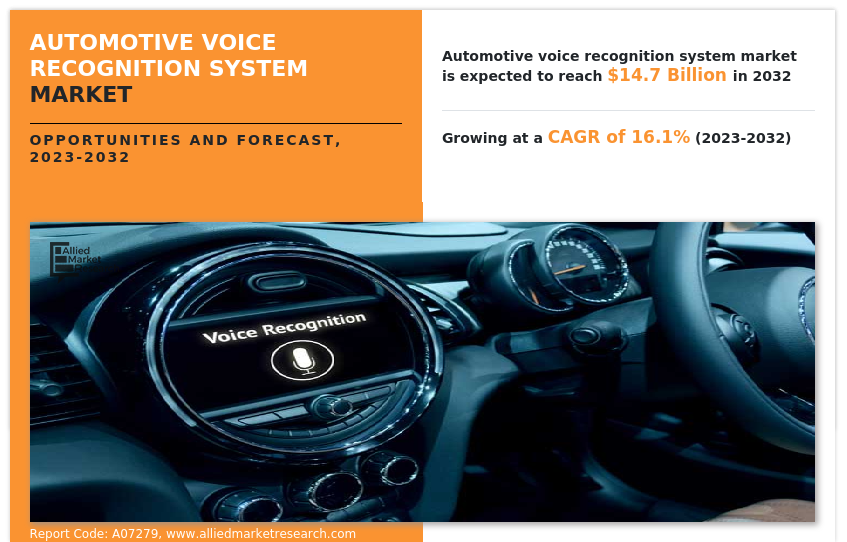
Voice recognition technologies in automobiles have grown and become more sophisticated over time. They are designed to recognize and respond to a wide range of voice requests, allowing drivers to use voice commands to conduct things like making phone calls, sending text messages, operating audio and navigation systems, and even modifying climatic settings.
In cars, voice recognition systems typically consist of a microphone to collect the driver's voice, a speech recognition engine that processes and interprets the spoken commands, and a control module that executes the appropriate actions based on the recognized orders. These systems may also include natural language understanding technology, allowing them to understand and respond to more complicated and context-based requests. The technology used in the automotive voice recognition system are embedded systems which are preinstalled in the car and have a limited set of commands. Another system is cloud based system which uses cloud computing to analyze and interpret the input from the user. There is one another system which is known as a hybrid system which utilizes both embedded and cloud based technology to offer a smooth working of the automotive voice recognition system. These systems are used across different types of vehicles which include economy vehicles, mid-priced and luxury vehicles which are propelled by internal combustion engines as well as electric battery and motors.
The factors such as demand for enhanced safety and regulatory requirement from the governments and rising adoption of digital technologies supplement the growth of the automotive voice recognition system market. However, high installation cost and data security concerns are the factors expected to hamper the growth of the market. In addition, integration with other technology and introduction of the voice commerce (V-commerce) create market opportunities for the key players operating in the automotive voice recognition system industry.
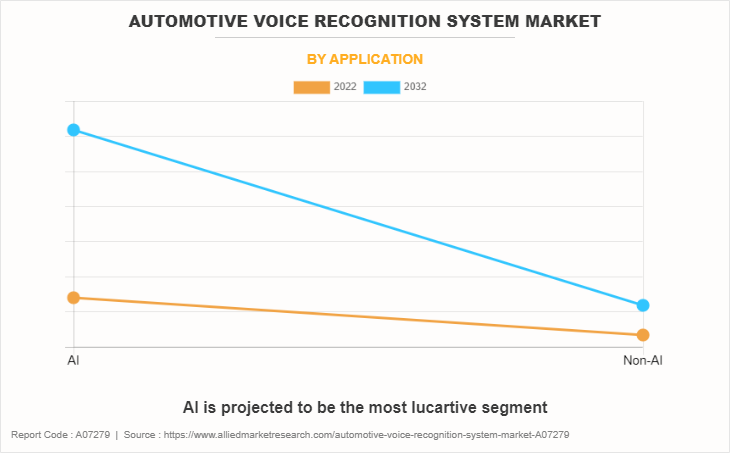
The global automotive voice recognition system market is segmented into technology, application, vehicle type, vehicle class, and region. By technology, the market is divided into embedded, cloud based, and hybrid. As per application, the market is categorized into AI and Non-AI. On the basis of vehicle type, the market is bifurcated into IC engine and electric. Depending on vehicle class, the market is classified into economy, mid-priced, and luxury. Region wise, the market is analyzed across North America, Europe, Asia-Pacific, and LAMEA.
The key players in global automotive voice recognition system market include Microsoft, Apple Inc., Google Inc., IBM, SoundHound AI Inc., Sensory Inc., Kardome Technology LTD, Amazon.com, Inc., HARMAN International, and Robert Bosch GmbH.
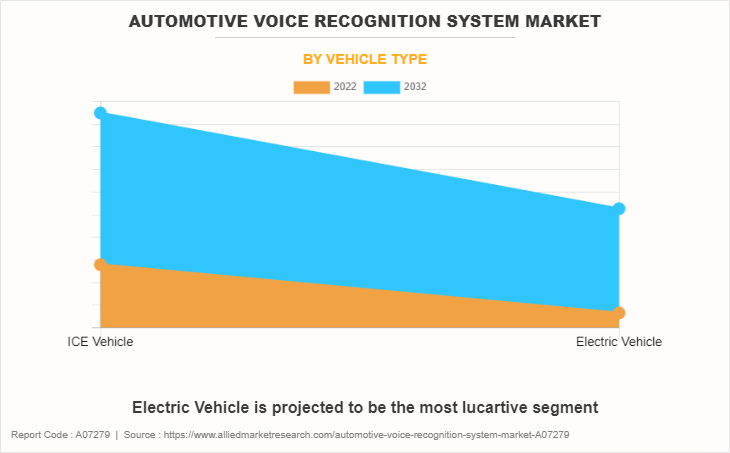
Demand for enhanced safety and regulatory requirement from the governments
Voice recognition technologies in automobiles improve safety by allowing drivers to maintain focus on the road while executing multiple duties. Drivers can operate several functions of the car with voice commands, eliminating the need for manual interaction with buttons or touchscreens. This increases convenience and reduces distractions, resulting in safer driving experiences. The implementation of rules all around the world prohibiting the use of any hand-held device while driving also propels the use of voice recognition systems. Many nations such as the U.S., Canada, and India have implemented such rules and regulatory authorities of the countries are emphasizing the significance of reducing driver distractions in order to improve road safety.
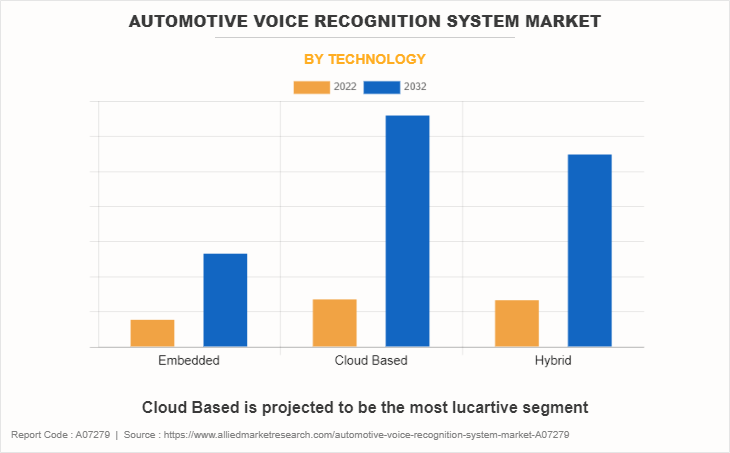
Rising adoption of digital technologies
Consumers are becoming more habituated to modern features and technologies in vehicles. Voice recognition systems enable drivers to interact with vehicles easily. The introduction of natural language processing (NLP) and machine learning advancements in the automotive voice recognition system have enhanced the accuracy of understanding human speech and makes it more adept to tackle various commands and speech given as an input by the user. Voice recognition systems can now better understand and interpret spoken commands, which makes them more user-friendly and efficient and helps in the automotive voice recognition system market growth. Voice recognition systems are becoming increasingly sophisticated and capable of interpreting complicated commands as technology advances.
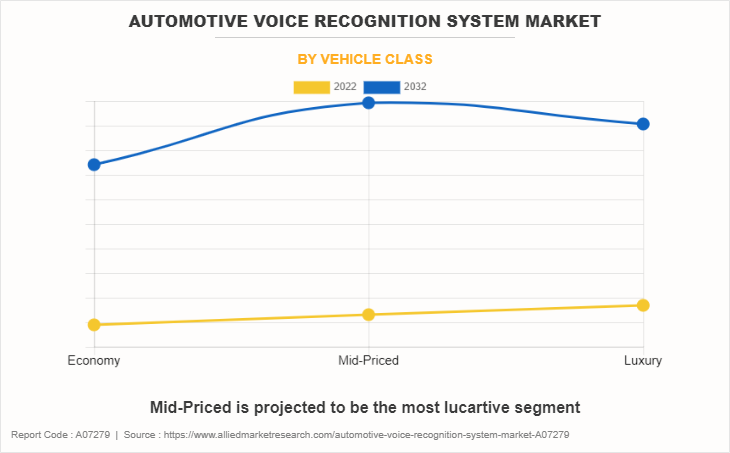
High installation cost
The high expense associated with speech recognition technology is one of the key constraints for the car voice recognition system. The cost of developing and integrating advanced voice recognition systems may limit its adoption, particularly in cost-sensitive market. Furthermore, it can be difficult to integrate speech recognition technologies into existing automobile platforms. It needs perfect integration with other in-car systems including infotainment, navigation, and connectivity services. The complexity of integration might present difficulties for automakers, resulting in implementation delays and potential compatibility concerns with other car components.
Integration with other technology
The integration of voice recognition systems with other technology, such as virtual assistants like Amazon, Alexa, and Google Assistant, improves the functionality and versatility of vehicle voice recognition systems. Drivers can access a variety of services and conduct things beyond the basic in-car controls, such as monitoring the weather, making restaurant reservations, or controlling smart home gadgets. This integration broadens the possibilities of voice recognition systems and boosts its market appeal. In June 2023, Mercedes-Benz conducted trials by integrating chat-gpt with the voice recognition system in the car and demonstrated the extent to which the automotive speech recognition system can be used to improve the driver's safety and driving experience. Furthermore, Amazon has been working with carmakers to bring Alexa on the road in recent years, either by installing the digital assistant into vehicles or providing more basic functions, such as allowing owners to lock their vehicle's doors using voice commands from their homes.
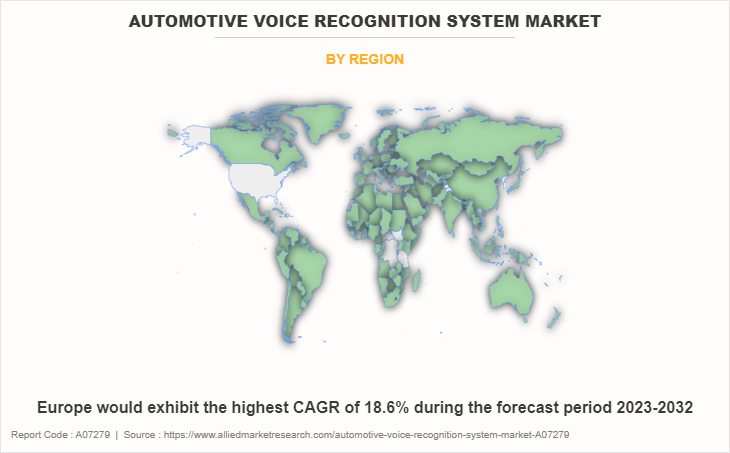
The company has so far created alliances with a rising number of automakers, including General Motors, Ford, BMW, Audi, Toyota, Hyundai, and Nissan. On January 2021, the business introduced a new service called Alexa Custom Assistant, which allows automakers and gadget manufacturers to create their own digital assistants based on Amazon's Alexa voice-enabled technology and allows manufacturers to integrate voice assistants into their vehicles. Despite the fact that it is based on Amazon technology, manufacturers can customize their digital assistant by programming unique wake words, voice, talents, and features such as search, traffic updates, and navigation. The cost of developing an intelligent assistant utilizing the service, according to Amazon, will vary depending on the device or car, customer use cases, and requirements for language. Such attempts by the software developers to allow integrating the voice recognition system in vehicle and the need from vehicle manufacturers to install the voice recognition system shows the opportunity for the market and the market player in the near future.
Key Developments
- In August 2023, SoundHound AI Inc. collaborated with Togg to deliver advanced AI technology that includes innovative Edge+Cloud connectivity, multiple language capabilities, and a custom-branded voice assistant to New Smart Vehicles. It offers features such as tracking and understanding the context of speech in real-time (even before the user has finished speaking), as well as addressing multiple questions and filtering results using SoundHound's proprietary Speech-to-Meaning and Deep Meaning Understanding technologies.
- In April 2023, SoundHound AI Inc. launched SoundHound Chat AI for Automotive. It is an in-vehicle voice assistant that gives automakers and customers access to the most powerful voice AI technology available nowadays. It offers an in-vehicle voice assistant that combines Generative AI capabilities, like ChatGPT, with an established best-in-class voice assistant.
- In January 2021, Amazon.com, Inc. launched Alexa Custom Assistant that enables automakers and device manufacturers to develop digital assistant, built on Amazon's Alexa voice-enabled technology and it is easier for automakers to bring voice assistants to their vehicles. Amazon formed partnerships with a growing list of automakers including General Motors, Ford, BMW, Audi, Toyota, Hyundai, and Nissan to develop its own digital assistant via Alexa Custom Assistant.
- In January 2020, Amazon.com, Inc. partnered with Telenav, Inc. to offer voice-first navigation through Alexa, providing drivers the convenience of hands-free, intelligent navigation for some places where reception is poor or nonexistent. Telenav is a leading provider of connected car and location-based services, focused on transforming life on the go for people.
Key Benefits For Stakeholders
- This report provides a quantitative analysis of the market segments, current trends, estimations, and dynamics of the automotive voice recognition system market analysis from 2022 to 2032 to identify the prevailing automotive voice recognition system market opportunities.
- The market research is offered along with information related to key drivers, restraints, and opportunities.
- Porter's five forces analysis highlights the potency of buyers and suppliers to enable stakeholders make profit-oriented business decisions and strengthen their supplier-buyer network.
- In-depth analysis of the automotive voice recognition system market segmentation assists to determine the prevailing market opportunities.
- Major countries in each region are mapped according to their revenue contribution to the global market.
- Market player positioning facilitates benchmarking and provides a clear understanding of the present position of the market players.
- The report includes the analysis of the regional as well as global automotive voice recognition system market trends, key players, market segments, application areas, and market growth strategies.
Automotive Voice Recognition System Market Report Highlights
| Aspects | Details |
| Market Size By 2032 | USD 14.7 billion |
| Growth Rate | CAGR of 16.1% |
| Forecast period | 2022 - 2032 |
| Report Pages | 463 |
| By Technology |
|
| By Application |
|
| By Vehicle Type |
|
| By Vehicle Class |
|
| By Region |
|
| Key Market Players | Kardome Technology LTD, Microsoft Corporation, SoundHound AI Inc., Amazon.com, Inc., IBM Corporation, Google Inc., Apple Inc., HARMAN International, Sensory Inc., Robert Bosch GmbH |
Cloud Based technology are the upcoming trends of Automotive Voice Recognition System Market in the world
AI is the leading application of Automotive Voice Recognition System Market.
Asia-Pacific is the largest regional market for Automotive Voice Recognition System
The global automotive voice recognition system market was valued at $3,430.9 million in 2022, and is projected to reach $14,711.3 million by 2032, registering a CAGR of 16.1% from 2023 to 2032.
The key players in global automotive voice recognition system market include Microsoft, Apple Inc., Google Inc., IBM, SoundHound AI Inc., Sensory Inc., Kardome Technology LTD, Amazon.com, Inc., HARMAN International, and Robert Bosch GmbH.
Loading Table Of Content...
Loading Research Methodology...



